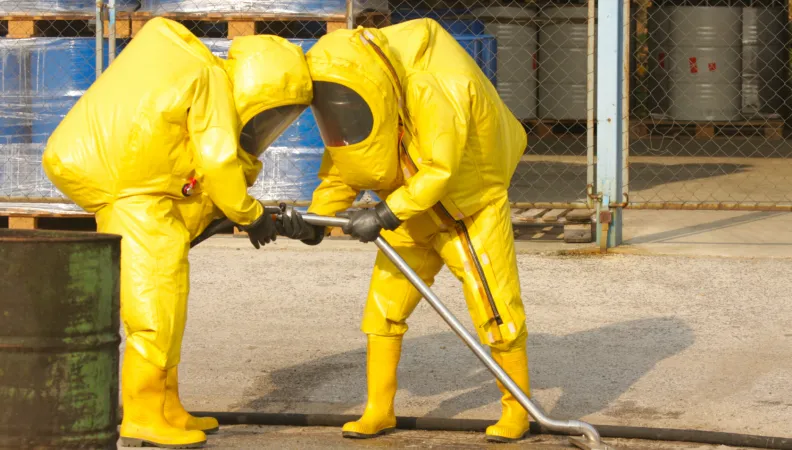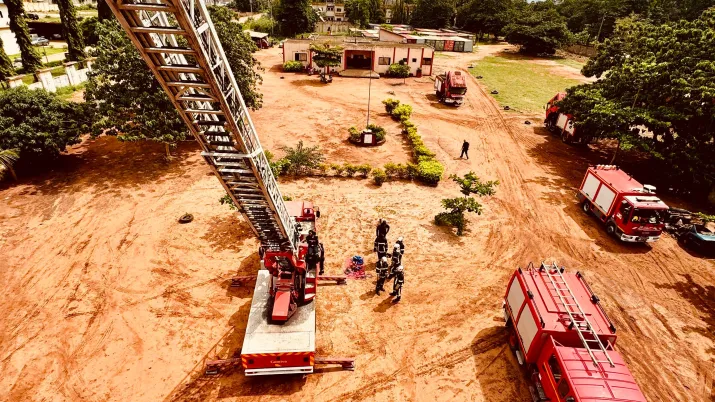Share the page
Enhanced cooperation to counter chemical, biological, radiological and nuclear (CBRN) risks
Published on

On 20 March, Expertise France devoted a new edition of its “Rendez-vous de l’Expertise” meetings to the management of CBRN risks. It was an opportunity to give the floor to French, European and African experts in a sector where pooling good practices contributes fully to providing appropriate responses to these human security issues. We take a look at the projects implemented by the agency in this field.
Mitigating CBRN risks poses a huge challenge, as they are an invisible yet major threat for people. Indeed, these risks encompass multi-sectoral risks for public health, the environment, and global security.
The Ebola epidemic in West Africa (2014-2016) and the Beirut Port explosion (2020) are powerful examples of the transboundary impacts of CBRN incidents. These crises, which affected people, infrastructure and ecosystems, remind us of the importance of prevention, international coordination, and strengthening national capabilities to better protect people.
While this year marks the 50th anniversary of the Biological Weapons Convention (BWC, 26 March 1975), Expertise France has been actively contributing to the European CBRN Risk Mitigation Policy for more than ten years, in particular through the CBRN Centres of Excellence Initiative, launched by the European Union in 2010. Through around 20 projects on the Atlantic and east coasts of Africa, as well as in Central Asia, the agency has supported the establishment of legislative frameworks, common standards and appropriate training, providing an effective response to CBRN threats.
International regulatory governance to enhance the coordination of mitigation action
As there are many factors related to CBRN risks – proliferation of hazardous materials, vulnerability of critical infrastructure –, and as biological and chemical weapons are easily concealed, there are many issues involved in detection and rapid response. Similarly, in the event of sabotage or natural disasters, nuclear and radiological facilities can have major transboundary impacts.
These threats are exacerbated by geopolitical developments and technological sophistication, which complicate prevention and international coordination.
Governments face a number of challenges in addressing these risks: strengthen legislative and regulatory frameworks, develop advanced detection systems, improve training for first responders, and promote global cooperation to prevent these threats and respond effectively to them.
The P95 – SAFETIC project (2022-2025), implemented in 11 Gulf of Guinea countries, aims to finalise the regulatory, operational and institutional framework to mitigate industrial risks related to facilities and the transportation of dangerous goods in the African Atlantic Façade region. The project has a collaborative approach, focused on these high-risk facilities and integrating local and international practices. In this respect, the activities organised are helping to formalise the legal framework to ensure effective regulation. This involves updating inventories and reference documents, and optimising emergency plans by strengthening security through the preparation of detailed plans and the organisation of crisis management exercises to test and adjust the emergency plans in real situations.
For the biosecurity aspect, the P99 BIOCAP-ECA project aims to facilitate the preparation of laws and regulations, the creation of biosecurity committees and frameworks, and integration into regional associations. These activities are being implemented in 11 East and Central African countries, including Ethiopia, Kenya and Uganda.
In this context, the CBRN Risk Mitigation Centres of Excellence Initiative of the European Union (EU) is contributing to the preparation of roadmaps for biosecurity and biosafety through an inventory of capabilities in the fields of human/animal health and the environment. It is also helping to ensure compliance with international requirements and regulations, including the Biological Weapons Convention, UN Security Council Resolution 1540, and international health regulations.
Local initiatives to promote good practices among field operators
To provide an effective response to these challenges, Expertise France focuses on skills development, training, and the creation of tools to enable personnel, experts, industries and governments to get a better grasp of human security and environmental issues. To this end, inter-agency coordination helps provide an appropriate and rapid response, especially in crisis situations.
Alongside Andra and IRSN, Expertise France is supporting the Radioprotection Centre of the Iraqi Ministry of Environment, by conducting training on the characterisation of radioactive waste and the inspection of decommissioning, remediation, treatment, storage and disposal facilities for this waste.
This project is being implemented as part of the European Instrument for International Nuclear Safety Cooperation (INSC) launched in 2014. It is helping to promote a culture of nuclear safety and radiation protection, the safe management of spent nuclear fuel and radioactive waste, and the application of effective and efficient safeguards concerning nuclear material in non-EU countries.
Study visits also enable national focal points and experts in the partner countries of these projects to learn more about the safety requirements for industrial sites. In October 2024, as part of the P95 project, national experts in Côte d’Ivoire benefited from a field exercise and discussion sessions to ensure the proper implementation of the exercises and strengthen regional cooperation on CBRN issues.
In June 2024, in Nairobi in Kenya, a seminar resulted in the development of a national tool for the evaluation of biohazards, adapted to each partner country, and informed about the key principles of biological waste management. Participants also learned more about international standards and UN guidelines on biological waste, with support from European experts from the BIOCAP-ECA project.
These issues are especially important in areas where CBRN risks rejoin French and European directives on maritime safety. In the Indo-Pacific region, the Global Ports Safety (GPS) project (2024-2028) covers eight countries in the area and aims to prevent and manage port incidents, with a focus on decarbonisation and the management of risks related to new maritime fuels. This project is co-financed by the EU and the French Security and Defence Cooperation Directorate (DCSD). It will ultimately result in the deployment of training sessions and equipment in 12 ports in 8 partner countries, including the Philippines, Thailand and Vietnam.

